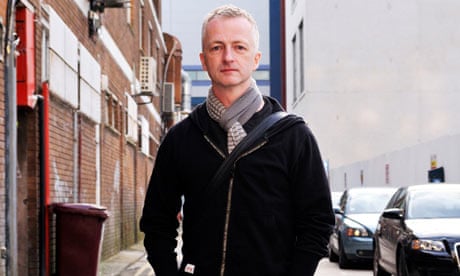Thirteen may be unlucky for some, but not for the National Theatre of Wales's artistic director, John McGrath, who has just announced a baker's dozen of productions to mark NTW's inaugural year-long season. It's an eclectic list, ranging from the first production for more than 50 years of The Devil Inside Him, a "lost" John Osborne play set in a Cardiff boarding house, written just before Look Back in Anger – to a new show, Mundo Paralelo, from the brilliant Welsh-based No Fit State circus. The 13th show of the season, which will take place in Port Talbot in April 2011, is to be Passion, a contemporary version of the old community plays that used to be performed amid the steel town's smoking towers. Actor Michael Sheen, who grew up there, is creative director of the project and will also star in it.
Funded by a £3m grant, the NTW's first season kicks off with A Good Night Out in the Valleys, which will be performed in the old mining institutes – the social and educational centres that sprung up in the late 19th century and were kept running, a penny at a time, by subscription from miners. In their heyday, some even had their own opera companies. "The valleys were the obvious place for us to start," says McGrath. "It's all about building a sense of ownership in these communities, and putting the people who live there at the heart of it. We have to listen hard to them. When they see the show, I hope that they will recognise their own stories, hear their own language."
McGrath doesn't mean Welsh – Wales already has a national Welsh-language theatre company, the splendid Theatr Genedlaethol. And though he was born in Mold, north Wales, just across the border from England, McGrath grew up in Liverpool. He's doing a crash course in the language (he jokes that he's "fluent between 8 and 10am every morning"), but, more importantly for the NTW, he comes with a reputation for pioneering work at Manchester's Contact Theatre, where he built a young and diverse audience through participatory initiatives.
The challenge for McGrath is to build an audience for the NTW in a country that has a long tradition of amateur performance, but one of the lowest attendance rates at professional theatre in the UK. McGrath thinks the answer is to make theatre in, and with, those communities. One such is The Soul Exchange, which will premiere in January 2011 at the old Butetown Coal Exchange in what used to be Tiger Bay, south of Cardiff – the place where the UK's first million-pound cheque was signed, but which remains an impoverished area, home to one of the most ethnically diverse communities in Europe.
Another part of the NTW programme will be a work focusing on Bridgend, the small town in south Wales that became the subject of intense media scrutiny after a spate of suicides by young people. Instead of commissioning a traditional play and staging it in, say, Cardiff, McGrath has commissioned playwright Gary Owen, a local boy, to return home to live with his mother and talk to young people; the piece that will result, Love Steals From Loneliness, will be performed in Bridgend itself. McGrath sees his job as much more than simply producing plays: NTW will also be aiming to spark a debate about the issues. Everyone will be encouraged to have their say.
Already, they are. If the Royal National Theatre is a listed building, and the National Theatre of Scotland "a theatre without walls", then the new NTW sees itself as a community. NTW operates out of an anonymous-looking shopfront on a parade in Cardiff and has a staff of just nine; crucially, it maintains a thriving website, which is a beacon for debate about theatre in Wales and beyond. The programme reflects conversations that have been taking place not just inside the theatre world, but in cyberspace too.
"We're aiming to make people partners," says McGrath. "The National Theatre of Scotland has been a very useful model – it shows that being a national theatre is not just about giving grants to people. But Wales is a different place, not least because there are far fewer producing theatres and more of an arts-centre tradition. So we've got to form relationships."
When McGrath put out a call requesting possible locations for performances, he was inundated with ideas. Many have been followed up. There will be outdoor theatre adventures made in collaboration with "pervasive gaming" experts Hide and Seek and played out on the beaches of North Wales. April 2010 will see a collaboration between Volcano Theatre and Welsh National Opera called Shelf Life, staged amid the book stacks of the old Swansea library, while performance artist Marc Rees will be taking over a chapel-turned-pound shop in the seaside town of Barmouth, curating a series of guided tours by Welsh and international performance artists. In the hills of Snowdonia, theatremaker David Harradine will create a project examining Welsh weather inside an aircraft-hangar-size space so vast it contains its own micro-climate. And in 2011, there will be the first-ever UK commission for the remarkable German company, Rimini Protokoll, who work with non-professional actors to create documentary theatre of astonishing intimacy.
It's not so much a programme as a map – one that charts the psyche of Wales as well as its past and present, but which also looks outwards. One performance even takes place right off the map: Aeschylus' The Persians, a hymn to the bitterness of defeat in war, which will be staged by Mike Pearson, founder of the legendary Welsh company, Brith Gof, on an army range in the Brecon Beacons normally out-of-bounds to civilians.
It all adds up to a year of work that is both radical but inviting, risk-taking but popular, and which places Welsh communities at its very heart. "We couldn't do it without them," says McGrath. "We wouldn't want to do it without them."
